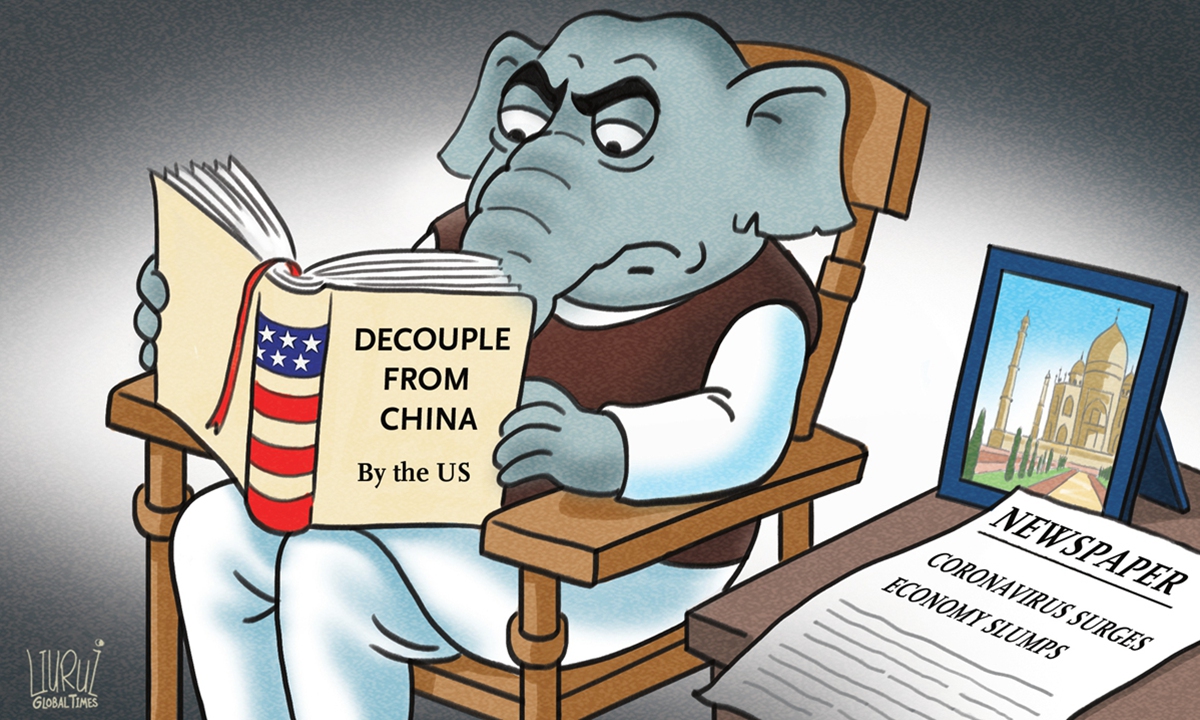
Illustration: Liu Rui/GT
In recent years, China-India relations have faced difficulties, and the Indian government's China policy is also full of entanglements. India seemingly tends to pursue "limited cooperation" under vigilance against China. This reflects four complex mindsets that have long influenced India's China policy.First, the victim mentality. The China-India border issue is a product of British colonialism. China suggests relations with India should be viewed from a global and strategic perspective, and that the border issue doesn't represent the whole of the China-India relations. However, India has forcibly pushed the issue weighting the entire relationship upon it. It's clear that India is to blame for the Galwan Valley conflict. But over the past two years, India has portrayed itself as a "victim" and blames China for the conflict, a mindset that has lasted over 60 years. The defeat in 1962 has had a profound psychological impact on some Indian elites and people. This has been made more problematic with nationalism at home, disrupting bilateral relations and creating uncertainty.
Secondly, the superiority complex. India believes that through Buddhism it has influenced Chinese culture, which gives India a sense of superiority in bilateral exchanges. In recent times, the West has sought to use India to contain China. During the Ukraine-Russia conflict, the West has attempted to bind China and Russia together and shape a showdown between "democracy and autocracy," while it praises India as the "world's largest democracy." This has made Indian elites think its international image and soft power are superior to China. Recently, India's "moment of glory" seems to have arrived, as its GDP has surpassed that of its former suzerain to become the 5th largest in the world, and its economic growth has accelerated with its demographic dividend emerging. In order to deal with China, the US has spared no effort in courting India and has even tolerated India's stance on sanctions against China. All these made Indian elites feel more confident in their foreign exchanges.
Third, the "chaser" mentality. India is well aware that China's overall national strength has far been stronger than that of India. This has led India to try and seize opportunities in the process of reshaping the global economy to amplify its own advantages to become a new base of global manufacturing and a global economic power. This has led to policies such as "Make in India" to catch up with China.
Fourth, the "speculator" mentality. India has always been good at seeking a strategic balance among great powers in order to maximize its own interests. Before 2020, India did not openly take sides between the US and China. After the two informal meetings between the leaders of China and India in 2018 and 2019, the upward momentum of China-India relationship was promising. After 2020, China-India relations have been on the decline due to border conflicts and military confrontation, followed by the rapid development of India-US relationship. The increasing strategic proximity of India and the US has enabled the Quad mechanism to quickly reach to the highest level of a leaders' summit, while India has responded positively to many regional initiatives such as the IPEF (Indo-Pacific Economic Framework for Prosperity), created by the US to contain China. Whilst the US continues to suppress Chinese companies and hype so-called "decoupling" from China, India has a tendency to do the same.
Nowadays, in the face of new changes in the international political, economic and security environment, the China-India relationship seems to have ushered in another period of detente. The bilateral trade volume has hit a new record high, and there has been good cooperation in the field of climate change. Recently, the leaders of the two countries shook hands during the G20 Summit in Bali, which has caused a lot of speculations. India is to host the G20 and SCO summits next year, will it become more active in communications and exchanges with China? This deserves attention.
The author is director of the research department at the National Strategy Institute at Tsinghua University. opinion@globaltimes.com.cn

